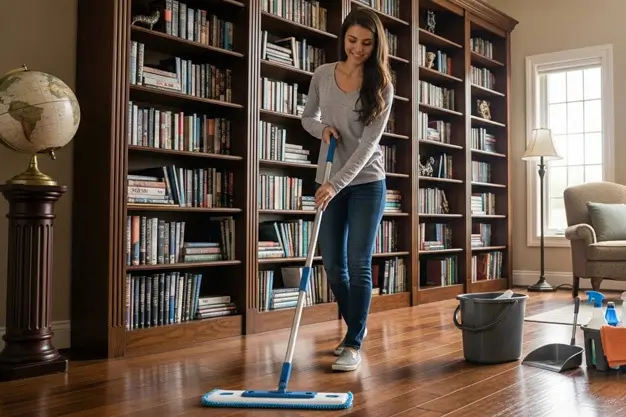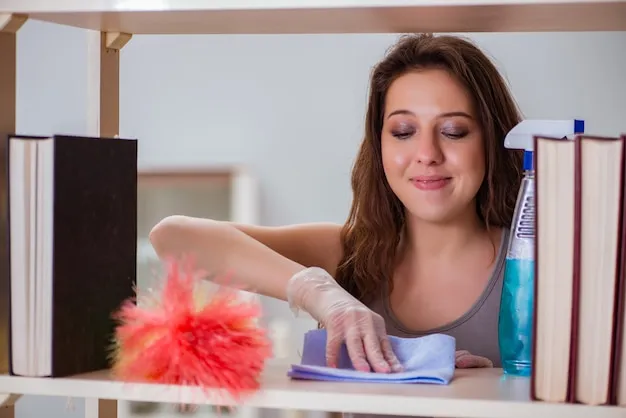Table Of Contents
Stepping into a home library should be a moment of quiet refuge, a place where the scent of paper and history calms the mind. Yet, for many book lovers, this space becomes a source of stress, cluttered with disorganized volumes and layers of dust that threaten the health of their collection.
Due to this issue, there is a concern that it is worth investing in professional home library cleaning. A well-maintained library is about preservation, creating a functional space, and protecting a lifetime of literary investment from decay. A deep clean addresses hidden threats like dust mites, mold spores, and grime that accelerate paper deterioration and damage delicate bindings.
Moreover, proper organization goes hand in hand with cleanliness, making the space functional and maximizing capacity, which is especially important in small city apartments. On the other hand, poor book organization can lead to increased chores and mold.
This is where specialized expertise becomes invaluable. Lazy Susans Cleaning offers professional home organization services specifically tailored to the unique needs of book collections. We will discuss the signs indicating it is time to call in the professionals and provide essential DIY tips for routine maintenance.
Why Cleaning and Organizing Your Home's Personal Library Matters
The longevity of your books and your mental health depend on keeping your home library neat and orderly. While clutter causes visual stress and makes it hard to find a beloved book, dust and dirt attract pests and can lead to long-term problems like mildew.
To safeguard your literary assets, Lazy Susans Cleaning has a wealth of experience organizing homes, including perfectly cleaning cramped areas and carefully organizing collections. A well-organized library is a peaceful, helpful, and healthful place.
Pro Tip: If you are worried about whether your house is too dirty for a cleaning service, check out our home cleaning tips to see how we handle even the most challenging spaces.

Step-by-Step Cleaning Guide for Your Home Library Cleaning
Giving your book collection the thorough cleaning it deserves requires a systematic approach to protect your valuable pages and bindings. Follow this simple, step-by-step guide to effectively remove dust and dirt from every surface in your home library.
Here are some of the steps you should follow:
Gather the Right Cleaning Supplies
For effective home library cleaning, you will need soft microfiber cloths, a vacuum cleaner with a brush attachment, and an archival-quality soft brush. Avoid harsh chemicals or damp rags for the books; use only a slightly damp cloth to wipe non-paper shelf surfaces. Having the proper tools prevents accidental damage to bindings and pages.
Dusting Books and Shelves Properly
Using a gentle, dry cloth or brush, dust the books one area at a time, moving material away from the binding by wiping from the spine toward the fore-edge. Vacuum the empty shelves after removing the books, then put the books back on the shelves. This two-step method guarantees that you will collect dust from both the supporting structure and the volumes.
Deep Cleaning Rare or Delicate Books
Start by gently removing surface dust with a soft brush or microfiber cloth, and use a low-suction vacuum for edges and covers. Avoid moisture or harsh chemicals, as they can damage fragile pages and bindings. For stains, only use archival-safe cleaning products and test on a small area first.
However, because deep cleaning rare or delicate books requires expertise and precision, it’s best to hire professional book conservators who can safely restore and preserve their condition.
Organizing Your Home Library Like a Pro
Organizing your home library like a pro means moving beyond simply stacking books and instead implementing systems that make finding, accessing, and caring for your volumes easy and intuitive. A professional approach provides both functionality and aesthetic appeal. Here are some steps you should follow:
Declutter Before You Organize
Eliminating what you no longer need, use, or desire is the first step in organizing any collection. Books that are badly damaged, duplicates, or ones you don't think you'll read again should be put aside for donation or recycling. By reducing the amount of stuff you have to handle, decluttering makes organization easier and more efficient.
Choose an Organization System That Works for You
Creating a well-ordered library starts with selecting a system that suits your reading habits and space. You can sort books by the Dewey Decimal System for a subject-based layout. The Dewey Decimal System categorizes books by subject into numbered groups, making it easier to locate titles by topic. The greatest strategy is the one that makes it simple and frustration-free for you and other family members to find a specific book.
Maximize Small Spaces With Smart Shelving
Installing tall, bespoke shelving that reaches the ceiling will make the most of the vertical space in confined spaces. To maximize small spaces or awkward locations, consider utilizing sleek, stackable storage units or adding pull-out shelves. Smart shelving keeps the floor space free while optimizing capacity without taking up too much room.
Preventive Care for Long-Term Book Health
Protecting your collection is as essential as the initial setup because establishing a good routine of preventive care is key to securing the long-term health and preservation of your books. Beyond just cleaning, adopting a sustainable home library organization system involves controlling the storage environment, thereby guarding your beloved books against common threats like pests, dust, and decay for years to come.
Ideal Environment for Book Storage
The ideal temperature range for books is 60 to 75 degrees Fahrenheit, with a relative humidity of 40 to 50 percent. Books do best in a steady, calm, and dry environment. Shelves should not be positioned next to exterior walls or near sources of moisture or heat, as proper air circulation is essential for preventing the spread of mold and mildew. Books should be kept out of direct sunlight as this speeds up the deterioration of paper and fading of bindings.
Routine Maintenance Schedule
Establish a basic cleaning schedule that includes using a soft, dry cloth or a vacuum brush attachment to lightly dust books and shelves every 1 to 2 weeks. Every 3 to 6 months, all shelf surfaces and book tops should be thoroughly cleaned to remove accumulated dirt and to check for any early signs of damage or pests. To identify minor problems before they become significant hazards to your collection, routine inspection is essential.
Common Mistakes to Avoid When Cleaning or Organizing Books
Here are some of the common mistakes you should avoid when cleaning books:
- Using harsh chemicals or water directly on book covers.
- Failing to regularly dust leads to mold and pests.
- Over-stacking books causes binding damage and warping.
- Neglecting to check for pests or mold during home library cleaning is common.
- Failing to choose a practical home library organization style before you start.
- Placing delicate or rare books next to heavy, frequently used volumes.
- Storing books in direct sunlight or near heat sources.
- Not ensuring stability when you organize the shelves.
- Ignoring humidity and temperature can lead to "red rot" or dryness.
- Assuming regular residential cleaning is sufficient for specialized book care.

When to Call in Professionals for Home Library Cleaning
People often get confused about when to call professionals for home library cleaning. This usually happens when the task becomes too extensive, specialized, or time-consuming for a homeowner.
You should consider calling experts like Lazy Susans Cleaning if you own a massive collection that requires an expert to organize a large home library, if your space is minimal and challenging, or if you have rare and fragile books that require delicate care beyond standard dusting.
Our services go beyond simple cleaning; we offer customized home library organizing tips and comprehensive solutions to help you effectively organize your personal library. Professional assistance guarantees your collection is preserved in the best condition, saving you significant time and effort while guaranteeing a deep, meticulous clean.
FAQs – Home Library Cleaning
How to clean a home library?
Start by dusting shelves and books using a soft cloth or brush, then vacuum the floor and any upholstered furniture. For deeper home library cleaning, use a slightly damp cloth on non-paper surfaces and a dry cloth for books.
Do dust mites live in old books?
Yes, dust mites can inhabit old books, feeding on skin flakes and mold spores that accumulate in the paper and bindings. Regular cleaning and maintaining low humidity help to mitigate their presence.
How to get rid of old library smell?
Ventilate the area well to remove musty odors, and place baking soda or activated charcoal near the books to absorb excess moisture. You can also explore our blog for more home library organizing tips to keep your collection fresh and well-maintained.
How often should I do my home library cleaning?
A light dusting and vacuuming should be done every 1-2 weeks; a deeper clean of shelves and book exteriors should be performed every 3-6 months. This is part of how you organize your personal library for long-term preservation.
Should I use professional help for large book collections?
For very extensive collections or rare books, consider professional services for advice on preservation and specialized cleaning. Professionals can offer expert insights on organizing a large home library and conservation techniques.
Conclusion
In conclusion, whether you choose a DIY approach or professional assistance, prioritizing home library cleaning and applying smart home library organizing tips is essential for book longevity. Remember, you don't have to tackle organizing a large home library all at once; start with small, manageable steps to organize your personal library and make the process enjoyable and stress-free.
If you find yourself overwhelmed or simply want an expert touch, our team at Lazy Susans Cleaning is ready to help alter your space. Click here to book your awesome clean and experience the best experience.
Moreover, if you think that you have the perfect maid service in NYC for your cherished collection, then it’s not true because maid services don’t offer the library cleaning that you require.
